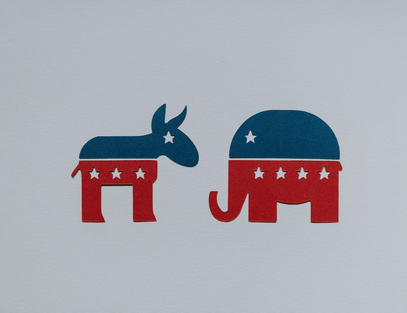
With about six weeks remaining before a high-stakes and divisive U.S. midterm election, private sector leaders might be thinking through how to address this political climate within their organizations. Like it or not, employees are bringing into the workplace more than ever their feelings about social, political, and racial issues.
Many organizations prefer to default to avoiding acknowledgment of politics. There’s too much risk; better to draw a bright line between work life and seemingly unrelated public matters. But the rise of GenZ, and an unending barrage of info that reaches everyone, all the time, rightly pushes many leaders to rethink their approach.
Here’s one reality you can bank on: Your employees don’t all see things the same way. With very few exceptions, count on having Democrats and Republicans, conservatives and liberals, and people on nearly all sides of every issue in your workplace. Those differences — along with varying perspectives tied to gender, race, religion, and age — make for a range of views on company and public policies.
Here’s one example. Taft has conducted a State of Diversity® survey for six years, and we’re always interested in not just overall trendlines, but also how differently people answer questions based on their political affiliation. In our 2022 national survey, 46% of workers who identify as Democrats agreed or strongly agreed that “the COVID-19 pandemic is an opportunity to directly address racial disparities.” That number dropped to 21% among workers identifying as Republican. One societal question; two very different views tied to one’s political lens.
So how can an organization navigate through these stormy political times in a way that neither politicizes itself nor shuts down people’s opinions? Here are some principles we suggest might guide you:
- Encourage participation: Regardless of where we all stand politically, most can agree that participating in the voting process is a good thing. Don’t be shy about encouraging your employees not just to vote, but also to volunteer at the polls or on campaigns of their choice — even potentially giving them time off to do so. Who they support and how they vote is of course an individual choice, but making clear that we all have a vested interest in a healthy democratic process shouldn’t be controversial.
- Be a vehicle for information: Even without promoting a political position, you can help inform your team. Consider pointing people to official debates or reputable websites, or create a webinar in which informed experts along the political spectrum can help people understand the issues. For example, Taft has on our team two former press secretaries who served Democrat and Republican governors. They can each entertainingly present their take on an upcoming New Jersey election season and provide balanced information.
- Create space for people to talk: Just as many organizations have created virtual and in-person forums to talk about their feelings around race and public health, it’s ok to create forums where people can engage in other respectful civil discourse. There shouldn’t be an official company point of view, but there can be ground rules for how participants talk about their political opinions (e.g., always respectful, no personal attacks, etc.)
- If it is important enough to your core values, take a stand: It’s riskier, but if you as a leader believe an issue on the ballot is tied deeply to the core purpose of your organization, go ahead and say it. Example: If your company is 100% committed to sustainable business practices and fighting climate change through its mission, and one of the local candidates is a die-hard climate denier, have your leader go on record about why that matters. Most employees will respect that you take your values seriously. Some may take offense but, if these are truly your values, maybe those are people who will self-select out of a long future with you anyway. Always make clear that everyone has the right to follow their own heart and mind and make their own choices — and personal political choices have no impact on their status with your organization — but make the case if it matters enough to who you are.
- Recognize the emotional impact after election day: Given the heated nature of politics today, some of your employees will be upset no matter how each major election goes. Recognize that some people will need a little time to process the election results. That doesn’t mean you need to give them time off (though, case by case, you might), but you can let managers know they should tread lightly in those first few days after a major political moment when nerves are frayed and feelings may be raw.
None of this is easy. But organizations that want to earn and retain the trust of their teams need to act more “human” than in times past. We can’t put our head in the sand when the winds are whipping around us. Do it in authentic and values-rooted ways — keeping a commitment to small “d” democracy and civility at the center — and you’ll likely find you gain far more than you lose.
Leaders interested in crafting a plan to refine and better communicate their core values and purpose: Get in touch to see how we can help. Send an email or fill out the form below.


